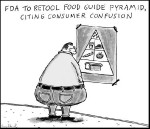Many people are acutely aware that we are not properly nourished but because of the confusion out there about what we should or shouldn't eat, people are inconsistently able to pull off a diet that is actually nourishing them. A great rule of thumb is: If you can't potentially raise it or grow it, you shouldn't eat it....If a food has health claims listed on the packaging, it is probably NOT good for you!
Unfortunately, product packaging is all about marketing strategies and not about truly informing the consumer. In the case of many snack foods such as crackers, chips, cereals, etc., the processing of them strips them of nutrients and so the processor then "fortifies" the food by adding back minute amounts of synthetic vitamins and minerals to be able to make claims of health. The problem with synthetic vitamins is that they are extracted portions or components of a nutrient, not the whole complex. When a vitamin is taken in isolation, you are missing all the other cofactors and minerals that help you to utilize and absorb that nutrient. There is also a strong likelihood of synthetic vitamins and minerals causing depletion of the other factors which are used in the conversion process.

My best recommendation to my patients is to shop the outside of the grocery store and stay away from the inner isles with the exception shopping for staples such as herbs and spices some canned goods, and some baking necessities. Fresh produce, meats, dairy and eggs are much better choices as daily food sources than packaged foods. There is a great video that goes through healthy snacks and how to make some of them from the Weston A. Price website.

Don't let the Food Pyramid fool you! The guidlines will not promote health or balanced blood sugar. My general recommendations, along with the Weston A Price Foundation is quite simple. Everyday, eat high quality, unprocessed foods from each of the following four groups:
- Animal foods: meat, poultry, fish, eggs and whole milk products
- Grains and legumes: whole grain baked goods, breakfast porridges, beans
- Fruits and Vegetables: preferably fresh or frozen
- Fats and Oils: unrefined saturated and monounsaturated fats including butter and other animal fats, palm oil and coconut oil, olive oil and peanut oil
- Eat sparingly: sweets, white flour products, soft drinks, processed foods, polyunsaturated and partially hydrogenated vegetable oils and fried foods.